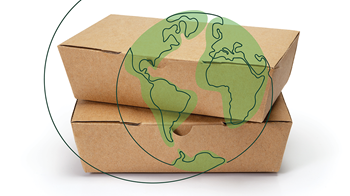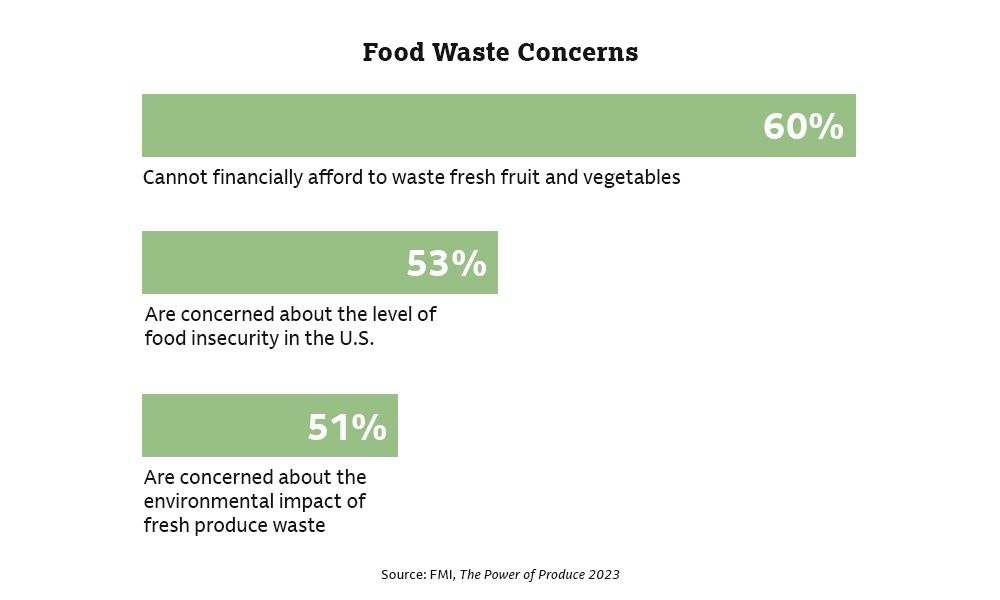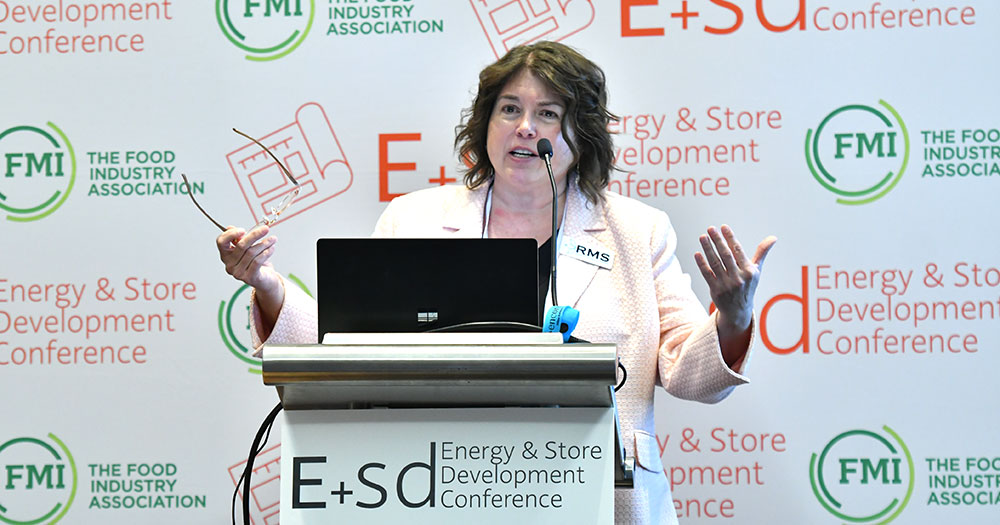This is the third installment in the FMI blog series on sustainability in the food industry. This series shares compelling research and covers aspects ranging from consumer perspectives to industry opportunities.
By: Andy Harig, Vice President, Tax, Trade, Sustainability & Policy Development, FMI
and Madalyn Farrar, Manager, Government Relations, FMI

There isn't much nice to say about waste.
The Merriam-Webster Dictionary defines it as "discarded as worthless, defective or of no use."
In contrast, there are a lot of positive things to say about waste reduction. Reducing food and packaging waste has become a bigger priority for consumers and food industry companies — for reasons ranging from financial to environmental. The momentum is building for reducing food and packaging waste even as the hurdles remain formidable.
Food Waste Considerations Drive Shopping Habits
Perspectives about food waste impact shopper purchase decisions, according to FMI's 2023 U.S. Grocery Shopper research.
- 59% of shoppers say they try to only buy the amount of food they absolutely need so nothing goes to waste.
- 25% of shoppers say they get good value when they can avoid spending money on something that will go to waste.
Shopper Concerns Stem from Multiple Factors
Food waste is a multi-faceted concern for consumers — ranging from financial to environmental — according to shopper feedback in FMI's Power of Produce 2023 report.

Strategies for Reducing At-Home Food Waste
Food waste in the home is very much on the radar of shoppers. About half of those surveyed for the Power of Produce 2022 report pointed to concerns about at-home waste involving produce and packaging.
More than 90% of those concerned were taking steps to limit food waste. The most common steps were buying in smaller quantities and purchasing items with longer shelf lives. Other strategies included buying more frozen (30%) and canned (25%) alternatives. Nearly 40% of respondents in the Power of Seafood 2023 research said making use of frozen seafood helps to avoid food waste.
Complex Assessments on Packaging Waste
Packaging waste is an important area of concern for consumers. There are many nuances to this topic, as illuminated in Power of Produce 2023.
- Preventing food waste is a bigger consumer purchase priority than environmentally-friendly packaging.
- 47% of consumers surveyed are concerned about the environmental impact of fresh produce packaging.
- 37% of those who consider the environmental impact of packaging would be willing to pay more for produce with sustainable packaging.
Educating Consumers on Waste Reduction
Food retailers and suppliers have opportunities to engage more deeply with consumers about waste reduction. Companies can share information on their strategies to lower the levels of food and packaging waste.
An important opportunity is ensuring consumers understand the industry's voluntary product date label strategy for packaging. It was streamlined a few years ago to focus on standardizing the date label messaging to avoid confusion that could lead to unnecessary food waste by shoppers.
Another educational tool is The FoodKeeper app, which offers food safety and storage advice to help shoppers maintain the freshness and quality of foods. The information was developed through the work of FMI, Cornell University's Department of Food Science, and the U.S. Department of Agriculture (USDA).
Industry Pursues Proactive Initiatives
Food retailers and suppliers are addressing food and packaging waste through a range of strategies.
- Sixty two percent of retailers and 65% of suppliers have quantified goals and implementation time frames for food waste reduction, according to FMI’s 2023 The Food Retailing Industry Speaks.
- 52% of retailers and 77% of suppliers have goals and time frames in place for package waste reduction.
In many cases companies without goals and time frames in place are currently working on them.
Other Resources and Tools for Companies
Here are some additional resources for food industry companies focused on reducing waste.
FMI's Sustainable Packaging Assessment Guide: This resource assists retailers and their suppliers in advancing efficient design, responsible sourcing, and circular systems for packaging.
Food Waste Reduction Alliance (FWRA): FMI is a founding member of this industry-led initiative focused on reducing food waste by increasing food donations and sending unavoidable food waste to productive use (energy, composting) and away from landfills.
U.S. Plastics Pact: FMI is a founding activator of this pact, which creates a unified national framework for a circular economy for plastics.
Making Progress Through Multi-Faceted Efforts
FMI is pleased that the industry's focus on waste reduction continues to build in response to consumer concerns. Waste reduction is a journey, not a one-time project. It requires focusing on a range of solutions to complex problems. FMI is committed to supporting retailers and suppliers throughout this journey.


 Industry Topics address your specific area of expertise with resources, reports, events and more.
Industry Topics address your specific area of expertise with resources, reports, events and more.
 Our Research covers consumer behavior and retail operation benchmarks so you can make informed business decisions.
Our Research covers consumer behavior and retail operation benchmarks so you can make informed business decisions.
 Events and Education including online and in-person help you advance your food retail career.
Events and Education including online and in-person help you advance your food retail career.
 Food Safety training, resources and guidance that help you create a company food safety culture.
Food Safety training, resources and guidance that help you create a company food safety culture.
 Government Affairs work — federal and state — on the latest food industry policy, regulatory and legislative issues.
Government Affairs work — federal and state — on the latest food industry policy, regulatory and legislative issues.
 Get Involved. From industry awards to newsletters and committees, these resources help you take advantage of your membership.
Get Involved. From industry awards to newsletters and committees, these resources help you take advantage of your membership.
 Best practices, guidance documents, infographics, signage and more for the food industry on the COVID-19 pandemic.
Best practices, guidance documents, infographics, signage and more for the food industry on the COVID-19 pandemic.
